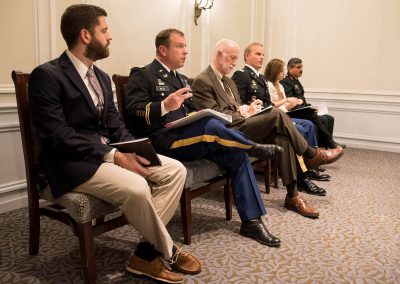
The Frederick S. Pardee School of Global Studies hosted a panel discussion, “NSS Next: National Security Strategy for the Next Presidential Administration,” Thursday night to review President-elect Donald Trump administration’s foreign policy.
Approximately 20 people, primarily Pardee graduate students, gathered and listened to the panel of six international relations experts.
The panel discussed recommendations for the next National Security Strategy, a document the government intermittently releases delineating its security aims. The discussion also focused on the United States’ global leadership and role in preserving international peace and stability.
Lt. Colonel Richard Balestri began the discussion by recommending that the United States continue to help shape the ever-changing global landscape.
“The global environment is turning towards multipolarity,” Balestri said. “Our unipolar moment, as you have seen post-Cold War up until the last decade or so, is coming to a close. The United States can either resist it, trying to hold on to our unipolar moment as long as possible, or embrace it.”
Balestri, a BU alumnus, explained the need for the United States to manage its power in collaboration with other countries and ensure its national interests.
The other panelists talked about the United States’ roles in the globalizing world.
Lt. Colonel Warner Wells talked about the country’s responsibility to help “support and strengthen the international systems” by establishing its own legitimacy on the world stage.
“In order to maintain U.S. legitimacy, U.S must be consistent with promoting international laws, the principles of self-determination, respect for the principles of sovereignty, equal rights and humanity rights,” Wells said.
Wells also emphasized that there are issues the United States is incapable of solving alone, including global climate change and epidemic diseases outbreaks.
Indian Army Brigadier Rakesh Kapoor elaborated on another initiative: promoting international peace and stability. He said fragile states are a threat to international peace and security.
Kapoor then suggested that as the world’s prosperity transitions from unipolar to multipolar, the style of leadership the United States adopts needs to evolve as well.
He also noted the importance of encouraging regional cooperation around fragile states.
“You need regional solutions and regional participation,” Kapoor said. “Regional participation ensures non state actors do not transition into fragile states.”
The discussion shifted to Nicole Rothenberg, a master’s candidate in International Affairs, and Kevin McLaughlin, a master’s candidate in International Relations and former CIA intelligence analyst.
Rothenberg criticized the United States’ overuse of military power and talked about the importance of focusing on international and regional institutions.
Rothenberg used Iraq as an example and argued that the United States had difficulty engaging with a fraction of the population not on board with the United States’ actions. She said creating regional partnerships would help the United States alleviate such misunderstandings.
McLaughlin then talked about sources of the United States’ strength, including its economic power, democracy value, military might and unity.
He believes, however, that the “core basis for American strength” has been eroding. For instance, globalization incurred increasing economic inequality within the United States.
Robert Loftis, a former U.S. ambassador to Lesotho, concluded the presentation with feedback on the other panelists’ recommendations.
Loftis suggested the nation focus more on existing international and regional organizations.
“There are already a lot of structures out there that normally do a good job in places where the military is not involved,” Loftis said. “We invest a lot of money in them but just not a lot of publicity.”
Several students said they found information presented during the panel useful, especially given the recent presidential election.
Bansari Kamdar, a first-year graduate student in Pardee, said the panel was educational.
“It helped me learn a lot about the direction that U.S. security policy was moving towards,” Kamdar said.
Sergio Valsahagun, another first-year graduate student in Pardee, said the panelists touched on his main area of study — security.
“I think that the new presidency is really going to affect security or at least going to change its path,” he said. “I’m interested to see what the people working in this field have to say about this path.”
Samantha Robertson, also a first-year graduate student in Pardee, said it’s important for students in the field to come and learn from experts.
“As a student of global studies, you need to be aware of everything and how it’s going to affect the international community,” Robertson said. “It is so interconnected that even though I’m focusing on Latin America studies, I still need to know what’s going on in the world.”












































































































